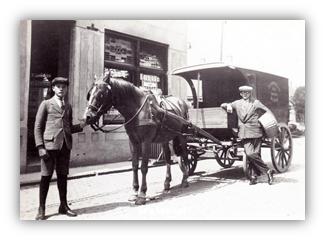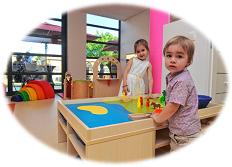The Family
The Family
There seems to be a world-wide concern about the family these days. In fact, 1994 has been declared "International Year of the Family" by the United Nations. I think it is safe to say that we all are very much concerned about the well-being of our families, and are also very much convinced about the importance of the family as a social unit for the well-being of society and the church.
Are we aware, however, of what has happened and is happening to the traditional family, and, subsequently, the effect of what is happening on our children?
 We live in a century in which we have seen dramatic changes in all areas of life. There were incredible changes in technology – from horse and buggy and dog-carts to space ships and computers.
We live in a century in which we have seen dramatic changes in all areas of life. There were incredible changes in technology – from horse and buggy and dog-carts to space ships and computers.
At the social level, child labour was outlawed. Education became available for everyone, and is now even compulsory up to age 16. There was the struggle for the rights of women, such as the right to vote, equal opportunities and equal pay for equal work.
One of the most important factors of the changes in society is the continuing secularization and particularly the secularization of the educational institutions. Much of the thinking of secular educators is based on the views of human nature of men such as J.B. Watson and B.F. Skinner, who were behavioural psychologists. Those men believed that all human behaviour is learned, including the way we think. Undoubtedly these men were influenced by John Locke, an English philosopher, who believed that a person is born as a blank slate, with no innate knowledge of good or bad whatsoever.
Out of the thinking of such men came the idea that, when we give people freedom and place them in the proper environment, with the appropriate rewards, we will eventually have a perfect society. (Read the somewhat controversial book Walden Two by B.F. Skinner.)
The traditional family was, and is, considered a hindrance in this process of developing the 'ideal society,' and so the traditional family as a social unit came under attack. Karl Marx and many others saw the family as an institution that restrained individual freedom. The feminist movement has promoted the elimination of the father from the family because the father is seen as the oppressor of both women and children. The economic institutions have promised individual freedom in exchange for what were traditionally family functions. The educational institutions have all but completely taken over the educational function of the family. Sexual and emotional fulfilment within the family also are under severe attack.
We admit that the critics of the family have some valid concerns. There were in the traditional family, indeed, and probably still are, fathers who were dictators, ruling their wives and children with an iron fist. In contrast, in many of today's families we see a lack of consistency and authority necessary for the development of the individual's personality.
Nevertheless, most people still greatly value family relationships and experience distress when those relationships do not function properly. I believe there is no viable alternative to the triad family for raising children to become responsible and stable individuals, and in spite of all the negative criticism and attacks, the triad family of father, mother and child has survived. It is well-known that children need both a father and a mother as role models. The Big Brothers and Big Sisters organizations were instituted, so that the role of the absent parent could be filled, at least part of the time.
The family, of course, does much more than supply role models. The family is more than just a group of individuals. Families have histories, values and beliefs which are transmitted from one generation to the next. These values and beliefs give meaning to life. These meanings are an important factor in the development of the individual's identity. The stable family provides the individual with the context for the affirmation of these values and beliefs and therefore of his or her identity.
Identity is not something a person is born with, rather it emerges from specific social processes. The children develop their specific identity in interaction with others. Identity is closely related to the overall framework of meaning within which we can make sense of our lives.
We must recognize that many of the traditional, as well as the contemporary families, had and have many shortcomings due to our fall into sin. Nevertheless, there is strong evidence from social research that there is no alternative institution that can instill basic moral values in the individual. And yet, we seem to be moving towards, what I have coined "public ownership of our children." (More about this later.)
 To find meaning in life it is necessary for a person to have a strong sense of belonging. For thousands of years, the major task of the family has been to provide that strong sense of belonging necessary for the socialization of the child. Sociologist Peter Berger says, quoting Herbert Mead, "Indeed socialization is impossible without a strong sense of belonging existing between the child and one or more 'significant' adults."
To find meaning in life it is necessary for a person to have a strong sense of belonging. For thousands of years, the major task of the family has been to provide that strong sense of belonging necessary for the socialization of the child. Sociologist Peter Berger says, quoting Herbert Mead, "Indeed socialization is impossible without a strong sense of belonging existing between the child and one or more 'significant' adults."
The Bible tells us about the closeness of the family unit too. God puts the task of the socialization of the children upon the parents. In Deuteronomy 6:7 we read, "…and you shall teach them – these words which I command you – diligently to your children, and shall talk of them when you sit in your house, and when you walk by the way, and when you lie down, and when you rise."
We could also say, "Teach your children when you have free time, when you work, when you go to bed and when you get up." This verse implies that the family was always together. There was that closeness, that sense of belonging, separate from the rest of society.
In Deuteronomy 4:9 God includes even the grandparents in the socialization process – "make them – the things you have seen – known to your children and children's children."
From the Bible as well as from more recent history we know that it was common that the traditional family consisted of three generations. With the industrial revolution this arrangement began to change slowly. After the Second World War changes in the family arrangement accelerated so that today we rarely see three generations under one roof.
Then there are the changes in the function of the family. Let's look at just a few of the main functions of the family that have changed and the effect it had on the family dynamics.
The economic function of the family used to include growing and processing food, making clothes, and chopping wood for cooking and heating the home. Today all we have to be concerned about is to bring in a paycheque and everything we need is readily available – food from the supermarkets, electricity for light and cooking from the P.U.C. or Ontario Hydro, and our homes are heated by Union Gas. Not only do we buy food, clothing and heat, no, we also buy our entertainment. Radio, TV, stereo and VCR are common items in most homes.
The educational function of the family has all but disappeared. Fathers used to teach their sons skills necessary for a particular trade. Mothers used to teach their daughters skills needed to manage the household and feed the family.
The economic, entertainment, and educational functions of the family were very much intertwined. The family members were together for a large part of the day. The little boy was with father in the shop. The little girl was with mother in the garden or in the kitchen. Soon the children wanted to help, so they began to contribute to the family's economy – it was perceived as play, but the children were learning in the process.
With the loss of those family functions came also the loss of much family togetherness and interaction. First, father started to work away from the home for a good part of the day. So now the father role became limited to a few hours in the evening, when he was weary from working all day. In the last few decades more and more mothers have to work outside the home in order to contribute to the economy of the family. These changes have fragmented the family unit. Due to shift-work many families cannot even be together for supper, except on weekends maybe.
This fragmentation of the family has also opened the family boundaries. More and greater outside influences on family values, norms and beliefs are the results.
The growing emphasis on individual fulfilment in society has affected the family, yes, also the Christian family. The sense of belonging in the family has diminished and subsequently the sense of mutual responsibility in caring for one another diminished. With caring for one another I mean care giving within the family context.
 Much of the care for family members has shifted to institutions such as hospitals, nursing homes and daycare centres. And, in spite of all the arguments for the importance of the "Triad Family" as the cornerstone of society and church, the institutional invasion of the family goes on.
Much of the care for family members has shifted to institutions such as hospitals, nursing homes and daycare centres. And, in spite of all the arguments for the importance of the "Triad Family" as the cornerstone of society and church, the institutional invasion of the family goes on.
I mentioned "public ownership of our children." Let me explain how I came to that conclusion.
First of all, I believe that there is such a thing as "mutual responsibility" for our children – mutual responsibility within the framework of the Covenant of Grace. Children born in the covenant are not only the responsibility of the parents, hut also of the congregation. But when I say that we are moving towards complete public ownership of our children, I mean that society has almost taken complete possession of our children.
Let's take a look at how that happened. At the beginning of this century most children received an education – by the educational institution – from age 6 to approximately age 12. As technology advanced the need for education increased, and more and more years were spent in education before entering the labour force or adulthood. This increased need for education affected not only the family structure, but also the family values and beliefs because of the increased interaction with a broader section of society.
With the advancement of technology, the education of girls changed dramatically. The traditional housekeeping skills were no longer needed. So girls as well as boys attended colleges and universities. Add to this change the rise of the feminist movement and the struggle for the equality of women, and the stage was set for the contemporary family.
The family, before the industrial revolution, was basically a self-sufficient social institution. Today the family is completely dependent on other social institutions to fill its needs. Not only is the family dependent on those institutions, these institutions decide and tell us what the family needs.
With the change in education and employment in industry came the change in living accommodations. From living in a house with a few acres and a few animals, people moved to urban centres away from the extended family. What does one do with a five-year-old, a three-year-old and a baby in a small apartment with nothing to do for the children? Educators began to tell us that the six-year-olds were not ready for grade one when they arrived at school. So we invented kindergarten for the five year-olds to make them ready for grade one. In the last few years educators came to the conclusion that actually four-year-olds are quite capable of learning. So we invented pre-kindergarten, because 'the earlier we get them started the better.'
Ontario has passed legislation so that now every elementary school must have facilities and staff in place to accommodate pre-kindergarten. It is not compulsory as yet to send our children to pre-K, but many people will send their children as it certainly saves on babysitting costs for those mothers who work outside the home.
Now there is yet one step left and that is daycare. We already have private daycare centres. But there is much pressure on the government to take responsibility for daycare of children. I believe that in the near future we will see daycare supported by public funds. And with public funding will come regulations of what can and cannot be done and taught by the caregivers in such centres.
Marion Boyd, the former Ontario Minister of Community and Social Services, said in early 1992, "We further believe that child care should eventually become a holistic extension of the public educational system…" The outcome of this development will be that children may become public property when they are three-months-old, and they will be raised by state (government) approved care-givers.
It may go something like the following: The Unemployment Insurance Plan pays 17 weeks of maternity leave. If an expectant mother works till the end of her eighth month of pregnancy, there is one month before and three months after the baby is born that she has an income while caring for the baby. Then she goes back to work and brings the baby to daycare. From there to Pre-Kindergarten, Kindergarten, and so on. Think about all the spiritual, moral and emotional influences on the child, over which the parents have no control.
 Not every mother is employed in the labour force and not every mother will bring her baby to a daycare centre, of course, but under certain circumstances it will be very tempting. I think it is safe to say that all of us are concerned about the effect these social developments have on our families.
Not every mother is employed in the labour force and not every mother will bring her baby to a daycare centre, of course, but under certain circumstances it will be very tempting. I think it is safe to say that all of us are concerned about the effect these social developments have on our families.
How can we offset the influences of society on our families? I say offset because we cannot take our families out of society. Even the Mennonites, although they have tried very hard, have not succeeded in completely safe-guarding their families from outside influences. We do not have to do it either, for even the Bible tells us "you are in this world, but not of this world."
In the world, or in society – if you like, yet separate from it. That is what the traditional family was and I believe the contemporary family can be. That is what HOME is all about. The family can be and should be the haven where one can come home to. The family should be the place where we can be ourselves – the place where every member of the family feels safe and secure, children as well as parents. The family is the place where we belong. There is no place in this world where we can have that same intense feeling of belonging. If a person cannot have that feeling at home, (for whatever reason) he will not have any feelings of belonging at all. This lack of a sense of belonging will have a negative influence on the development of the child.
In order to create such a safe and secure environment, it is necessary that the family members have mutual respect for one another. There must be an appropriate family structure. There is a need for authority and consistency, not an authoritarian rule. With proper authority every family member has the privilege to be heard, regardless of their age.
Consistency, without being rigid, is a very important factor in the development of values and beliefs in the child. Consistency in the values and norms we teach and those we practice, but also consistency in the family situation.
One of the most devastating experiences for a child is separation and divorce. In a daycare centre children often experience similar feelings because of frequent staff changes. In the family, the child learns to develop trust – Mom and Dad are always there for me. They care for me, they protect me. They pray for me. Outside of the family the child can never be sure whether the caregiver will he there or not the next day!
How can we as Christians, who believe that children are a gift from God, help to defend the family against some of those attacks?
God gives us children to raise them to serve Him. We must lead them to Jesus, first of all. But there is more. We must raise them to serve the Lord in whatever place they will occupy in society. This training of children is a God-given task which must take priority over everything else.
When we give priority to raising our children according to Biblical norms, we may have to adjust our standard of living downward. We may have to forego some social or church involvement which we would love. Maybe we will have to forego some of our pleasures in order to give priority to the family.
Now we come back to the mutual responsibility for our children within the Covenant of Grace. I mentioned earlier Deuteronomy 6:7 and Deuteronomy 4:9, but also in the New Testament we read numerous times that we are 'to care for one another.' Now where would that apply more than within the family, including the extended family? Did not God make His covenant with us and our children?
Earlier I mentioned that God even includes the grandparents – "make them (the things you have seen) known to your children and children's children." But I have often heard grandparents say, "I have raised my children, let them raise their own." Is such an attitude really in accordance with what Scripture tells us? Today people are healthier and live longer than they used to. Many parents are finished raising children when they are in their (early) 50's. I believe grandparents have a task in the defense of the family.
 There are many ways in which grandparents can help. Also for them it is a matter of setting priorities. Yes, it is good and helpful to help pay for Christian education, but it is not enough! We need to interact with our children and grandchildren. We must let them know what the Lord has done for our soul (cf. Ps. 66). We must tell them how we struggled to find meaning in our lives. Our grandchildren should know how the Lord encouraged, strengthened and sent deliverance in the difficult situations of our lives. Those kinds of interactions the Lord will bless. They will strengthen the family and instill values and beliefs in our children.
There are many ways in which grandparents can help. Also for them it is a matter of setting priorities. Yes, it is good and helpful to help pay for Christian education, but it is not enough! We need to interact with our children and grandchildren. We must let them know what the Lord has done for our soul (cf. Ps. 66). We must tell them how we struggled to find meaning in our lives. Our grandchildren should know how the Lord encouraged, strengthened and sent deliverance in the difficult situations of our lives. Those kinds of interactions the Lord will bless. They will strengthen the family and instill values and beliefs in our children.
Then there is the church community for those parents who do not have, or do not have access to an extended family. I know of one Reformed congregation where the mothers got together and arranged for the care-giving of one another's children. By using these family and church resources for the care of our children, there is in a general sense consistency in family values and beliefs.
I am well aware that it is not an easy task to make any of these suggested arrangements to care for our children. But I do believe that it is possible with some effort. It is all for the wellbeing of our children, actually God's children (cf. Ezek. 16:21).
Secular society is trying to take possession of our children; are we going to let it happen? We also have been affected by that wide-spread individualism! Are we willing to follow the Lord's commandments "to care for one another, watch over one another, and bear with one another?"
Sunday School, Catechism classes and Christian Schools can only affirm what is believed and practiced in the family. We will never have the perfect family in this broken and sinful world. God knows that. Nevertheless, He promises His blessings on the families that walk in His ways.

Add new comment